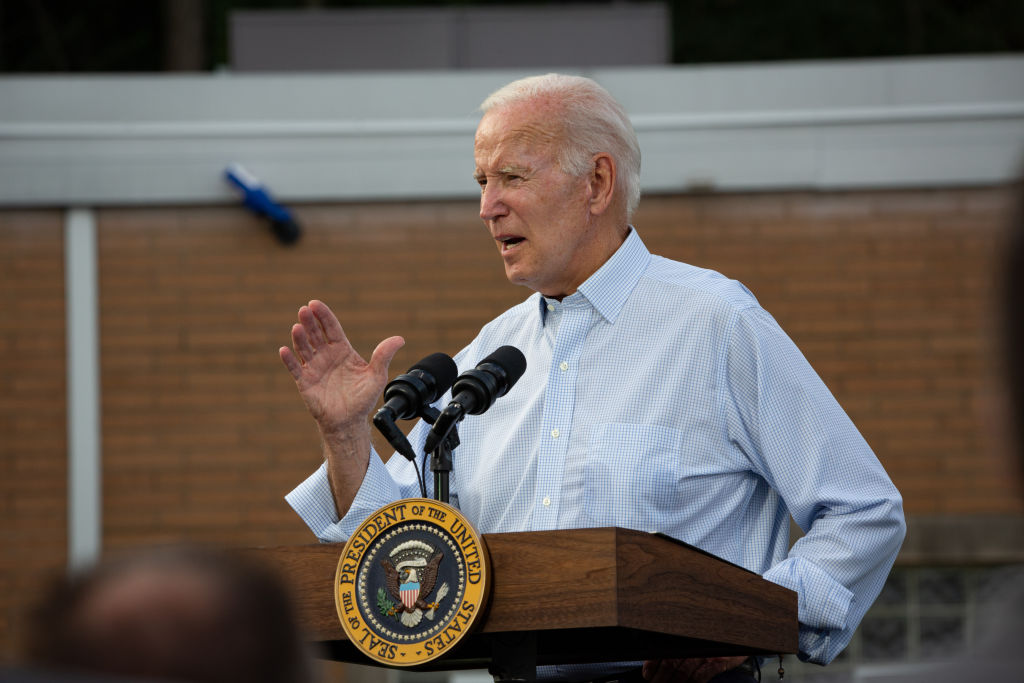
The Biden administration is pressuring labor unions and freight-rail operators to agree on a new contract before a Friday deadline to avert a strike that risks disrupting the U.S. economy and undermining Democrats’ midterm election prospects.
President Joe Biden has been briefed on the matter and is closely tracking the work of Cabinet officials and economic advisers—which has included multiple meetings of the National Economic Council, a White House official said Monday.
Underscoring how high the stakes are for Biden, the official said the administration has made clear to the negotiators that a shutdown of the freight-rail system is an unacceptable outcome for the economy.
Labor Secretary Marty Walsh on Sunday evening again pressed the parties to reach a resolution, the Department of Labor said in a statement Monday. Cabinet and administration officials have made dozens of calls to the involved parties, and Walsh is postponing a trip to Ireland to deal with the impasse, a department official said.
Freight railroads and labor unions worked through the weekend in a bid to hammer out a new contract to avoid a strike that could snarl supply chains, disrupt agricultural deliveries and cost the U.S. economy more than $2 billion a day.
Read More: American Companies Have Always Been More Anti-Union Than International Ones. Here’s Why
A strike also would carry significant political risk for Biden and his fellow Democrats, whose efforts to hang on to their House and Senate majorities in the Nov. 8 elections have been boosted by a string of legislative victories and improving economic news. Supply-chain disruptions less than two months before voters go to the polls could hurt Democrats and put Biden—who has pledged to be the most pro-union president in history—in a bind.
While 10 of 12 railroad workers’ unions have struck new labor deals, the two holdouts—the Brotherhood of Locomotive Engineers and Trainmen and the International Association of Sheet Metal Air, Rail, and Transportation Workers—account for more than 90,000 rail employees.
Railroads have advised customers of some potential service disruptions starting on Monday if talks don’t progress ahead of a potential walkout on Sept. 17. Six Class I freight railroads will begin to take steps to “manage and secure” shipments of some hazardous or sensitive materials starting Monday, the Association of American Railroads, a trade group, said in a statement.
A work stoppage also could hamper food shipments and would come a particularly perilous time, said Brooke Appleton, vice president of public policy at the National Corn Growers Association.
“Rail is an essential piece of the agricultural supply chain, particularly as we approach harvest season, so any disruption to rail services would have a negative and lasting impact on our growers,” Appleton said via email. “Given what is at stake for the agricultural community and other sectors of the economy, we hope all parties will come to an agreement.”
Emergency Board
Railroads and workers have faced years of challenging negotiations, which began in January 2020, shortly after the labor contract froze at 2019 levels. After the National Mediation Board failed to carve out an agreement this summer, the Biden administration’s Presidential Emergency Board recommended a 24% compounded wage hike by 2024 and $5,000 in bonuses, including some retroactive elements. The AAR said such a wage gain would be the biggest in at least 40 years.
Congress would act to avert a strike that could shut down freight-rail operations across the country, House Majority Leader Steny Hoyer said Monday.
Read More: Planes, Trains and Automobiles Are Cutting Emissions. Will Big Ships Do It Too?
“There is a role for Congress if in fact they fail to reach an agreement,” the Maryland Democrat said on Bloomberg Television’s “Balance of Power” with David Westin. “We can pass legislation if needed.”
Industry groups, including the US Chamber of Commerce, have urged lawmakers to intervene by extending the Friday deadline for a deal or to force both sides to accept a settlement.
“A national rail strike would be an economic disaster— freezing the flow of goods, emptying shelves, shuttering workplaces, and raising prices for families and businesses alike,” chamber President Suzanne Clark said in a statement.
Congress has the power to delay or halt a rail work stoppage altogether. In 1986, lawmakers extended a no-strike rule for 60 days to continue negotiations with the Maine Central Railroad Union.
And in 1991, Congress ended a national railroad strike less than 24 hours after it began through a joint resolution. The House vote was 400-5.
–With assistance from Kim Chipman and Ian Kullgren.
More Must-Reads from TIME
- Donald Trump Is TIME's 2024 Person of the Year
- Why We Chose Trump as Person of the Year
- Is Intermittent Fasting Good or Bad for You?
- The 100 Must-Read Books of 2024
- The 20 Best Christmas TV Episodes
- Column: If Optimism Feels Ridiculous Now, Try Hope
- The Future of Climate Action Is Trade Policy
- Merle Bombardieri Is Helping People Make the Baby Decision
Contact us at letters@time.com